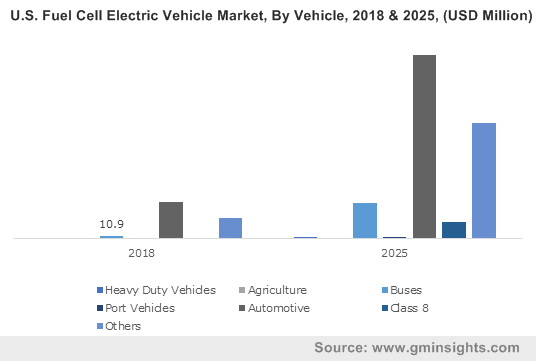Long distance-based fuel cell electric vehicles (FCEV) market to accrue massive returns by 2025, proliferating zero-emission automobile manufacturing trend to augment the global industry landscape
Publisher : Fractovia | Latest Update: 2019-05-24 | Published Date : 2018-02-02Request Sample
The robust growth being witnessed across global renewable energy sector has created a slew of opportunities for the fuel cell electric vehicles industry stakeholders. In addition to this, the dire need to lower the impact of greenhouse gases has compelled regional and international regulatory bodies to lay down stringent laws pertaining to the fuel emission standards – a phenomenon that has boosted the growth prospects of the fuel cell electric vehicles market.
Apparently, these regulations have led prominent FCEV industry participants to deploy extensive resources in refining the current fuel cell technology and to revamp the existing network of fuel cell EV charging stations across the globe. Consequentially, all the aforementioned factors have invariably proved to be quite instrumental in contributing toward the rising popularity of the worldwide fuel cell electric vehicles (FCEV) market.
U.S. Fuel Cell Electric Vehicle Market, By Vehicle, 2018 & 2025, (USD Million)

Moreover, owing to a marked increase in consumer preference for fuel cell-powered vehicles over battery-powered ones, the sales graph of the leading fuel cell electric vehicles industry giants has benefited immensely. The rising preference for these vehicles can be attributed to the fact that the primary advantage of fuel cell-powered vehicles is that they can be charged in less time than the vehicles running on batteries. Add to it, fuel cell electric vehicles are known to cover longer distance after a single charge, possess better torque, enhanced field configuration, and greater off-road mobility than the battery-powered ones.
This goes on to demonstrate the rising enthusiasm of a large number of fuel cell electric vehicles industry players to manufacture fuel cell-powered long-distance SUVs and trucks. To cite an instance, one of the major FCEV market behemoth Toyota Motor North America, Inc, has recently announced its heavy-duty truck prototype. Reportedly, the latest concept truck possesses advanced hydrogen fuel cell system that is anticipated to enlarge the application scope of zero-emission fuel cell technology.
Furthermore, the truck is said to have unmatched torque capacity to transport goods over short and long distances and is likely to conduct port drayage operations seamlessly. Consequentially the aforementioned factors would assist long distance traveling automobiles segment to garner a considerable proportion of the global industry volume by 2025.
As per some reliable sources, the deployment of fuel cell charging stations is particularly brisk across Europe as the continent consists of nations known to be strong proponents of the hydrogen economy. For instance, Denmark recently made it to the headlines as the first country to deploy a nationwide fuel cell charging infrastructure. Furthermore, Germany has emerged as the frontrunner in fortifying its presence in the Europe fuel cell electric vehicles industry given that the western European nation is projected to build around 400 fueling stations over the course of next few years.
It thus goes without saying that the efforts that are being made to strengthen the charging stations would impel the overall fuel cell electric vehicles (FCEV) market share augmentation in the immediate future.
Elaborating further, many acclaimed automakers including General Motors, Toyota, Volkswagen, etc., have declared aggressive investment plans to manufacture more zero-emission automobiles which would propel the fuel cell electric vehicles market share in the ensuing years. For instance, touted as one of the most preeminent FCEV industry players, Ford Motor Company has recently made it public that it would accentuate its investment to manufacture fuel cell-powered cars by over two times. The latest announcement would reportedly take the total investment figure to an astounding USD 11 billion over the next few years.
Considering the aforementioned factors, it is quite undeniable that the worldwide fuel cell electric vehicles market has been set upon a favorable progression path. To add to this, various governments across the globe have been undertaking comprehensive programs to bolster the utilization of zero-emission automobiles to contain the ever-rising levels of pollution. Apparently, all these aspects have eventually generated an unprecedented anticipation regarding the growth potential of the fuel cell electric vehicles (FCEV) industry which is forecast to surpass USD 11,600 million by 2025.